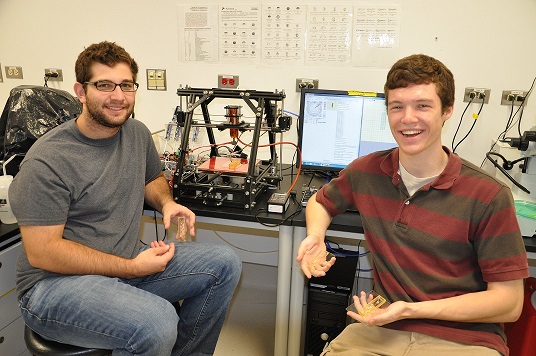Student-led projects win Nanotechnology Entrepreneurship Challenge

Five Virginia Tech student-led teams triumphed in the first-ever Nanotechnology Entrepreneurship Challenge, hosted by the Institute for Critical Technology and Applied Science.
The goal of the contest is to take nanoscale science and engineering ideas from concept to creation, and apply them to current challenges in the fields of public health and medicine.
Students were encouraged to develop innovative ideas, become project leaders, and think creatively as they worked alongside faculty members to transition promising concepts from the lab-bench to society.
Winning projects include novel sensors that can detect breast cancer cells, 3-D synthetic tissue scaffolds that can mimic tumors and improve the assessment of cancer therapies, and “smart” salt-responsive bandages that adhere even on wet areas of the body.
Each winning team receives continued faculty mentorship along with $2,500 to further develop the project, and up to $2,500 of in-kind business services from VT Knowledgeworks, a subsidiary of the Virginia Tech Corporate Research Center that encourages creative entrepreneurship.
Services include membership in the VT KnowledgeWorks program, competitive market research analysis, meetings with professional mentors, and attendance in a Startup Readiness Workshop.
“We’re excited to make these funds available to stimulate entrepreneurship and help student-led teams advance innovative nanotechnologies toward solving real-world problems in society,” said Matthew Hull, program manager for the nanotechnology research portfolio within the Institute for Critical Technology and Applied Science.
“The nano-bio intersection is fundamentally very exciting, and this program engages student entrepreneurs to solve challenging problems that arise at that interface,” said Roop Mahajan, director of the Institute for Critical Technology and Applied Science.
Teams selected for support this year were
- Marjorie Willner of Briarcliff Manor, New York, a Ph.D. student with an environmental nanotechnology focus, and her advisor, Peter Vikesland, a professor in civil and environmental engineering. Her research is titled, “The last health monitoring frontier: real time pathogen detection from bodily fluids.” Her goal is to create nano-enabled, reusable sensors for the individualized analysis of bodily fluids and skin microbiome, focusing on influenza detection. Additional faculty mentors include Linsey Marr, a professor in civil and environmental engineering, and Elankumaran Subbiah, an associate professor in biomedical science. "The NTEC program has provided me with an excellent opportunity to learn the skills and gain the connections needed to take my laboratory discoveries from knowledge with implications to physical devices that can have a positive impact on people's lives," Willner said.
- Vaishnavi Srinivasaraghavan of Bangalore, India, a Ph.D.student focused on developing sensors for studying cancer cells, advised by Masoud Agah, an associate professor for electrical and computer engineering. Her research is titled, “Bioimpedance sensor for non-invasive detection of breast cancer cells in clinical samples.” Her goal is to use nano-enabled electrodes to improve the sensitivity of detecting breast cancer. Additional team members include Dong Wang, a Ph.D. physics major, and faculty mentors Jeannine Strobl, a research professor in electrical and computer engineering, and James R. Heflin, a professor of physics.
- Yahya Hosseini of Kashan, Iran, a Ph.D. student focused in biomedical engineering, also advised by Agah. His research is titled, “Microengineered 3-D nano-environment for in vitro toxicology applications.” His goal is to create 3-D structures that mimic the tumor microenvironment and improve the assessment of emerging cancer therapies.
- Chainika Jangu of New Delhi, India, a Ph.D. student studying macromolecular science and engineering, advised by Tim Long, a professor of chemistry and the associate dean for research and international outreach in the College of Science. Her research is titled, “Switchable wet tissue pressure sensitive adhesives based on salt-polyelectrolyte complexes.” Her goal is to design salt-responsive smart adhesives suitable for physiological conditions. Additional team members include Alison Schultz and Keren Zhang, both Ph.D. chemistry majors. “The NTEC award enables me to see the big picture. I always wanted to do something that involves creativity, problem solving, people skills, and innovation. My advisor has always encouraged me to take risks and explore new ideas. We have the best technology, science and expertise in our laboratories, but translation is often the challenge. NTEC is helping me to learn how to execute a discovery, which is going to be valuable to society,” Jangu said.
- Geoffrey Richards of Baltimore, Maryland, a senior majoring in mechanical engineering and advised by Carla Finkielstein, an associate professor in biological sciences, received a $1,000 award for his research project titled, “Developing of vascularized 3-D scaffolds for evaluation of drug candidates.” His goal is to develop cost-efficient 3-D tumor structures for direct assessment of potential therapeutic drugs. The team is also supported by Michael Sholes, a lab volunteer.




